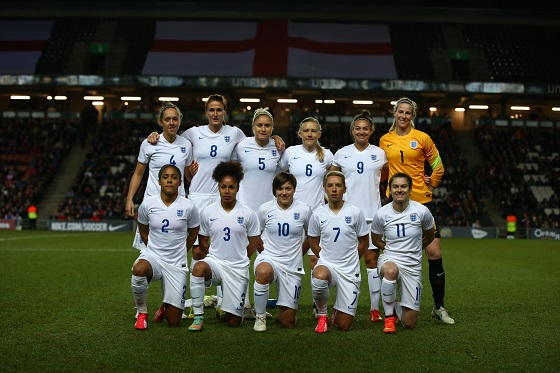The England Women’s national team have already made history by reaching the semi-finals of the World Cup for the first time, and now a De Montfort University Leicester (DMU) expert on women’s football has spoken about the possible future benefits their success can bring.

In reaching the last four of the competition, including dumping hosts Canada out along the way, the England Women’s football team have bettered the three occasions on which they’ve made the last eight. They now face a tie with reigning champions Japan – a team with which there is a long lasting rivalry.
Jean Williams, deputy head of the Sports History Research Group within DMU’s International Centre for Sports History and Culture (ICSHC), has spoken about the possible benefits this World Cup run could have for the women’s game in this country.
Jean, who also has books published on the history of women’s football, said: “What’s particularly encouraging about this tournament is the global media interest it’s getting.
“You look at some of England’s brightest young players – Fran Kirby, Lucy Bronze, Ellen White – and they’re all getting their moment on an international stage and it helps players to make a name for themselves.”
This is already the biggest Women’s World Cup since FIFA’s inaugural tournament held in China in 1991. A record 24 teams arrived in Canada for this year’s tournament and US broadcasters Fox Sports were averaging more than a million viewers per game earlier in the tournament, while BBC reported 1.6 million people tuned in as England disposed of Canada over the weekend.
Jean now hopes the elevated exposure that the England Women’s team are receiving will have a positive impact on the English domestic game.
RELATED NEWS
DMU graduate walks Wembley Way with internship at the FA
Study at DMU's International Centre for Sports History and Culture
Visit DMU! Come along to our next Open Day
She added: “A lot of players play in more than one league because they can build a more professional profile for themselves on a more global stage. Hopefully from this we’ll be able to draw in more players to the Women’s Super League (WSL) here which will improve the quality.
“We could also see an increase in spectators at WSL games because people will be able to watch these players they’ve seen on TV at the World Cup week in week out across the country.”
It’s not too hard to pinpoint why this England team have enjoyed more success than their predecessors on the World Cup stage according to Jean. She said: “Relatively modest investment from the FA in women’s football is paying dividends on the pitch.
“There’s never been this sort of investment before with sports psychologists, extended support and backroom staff and the use of St. George’s Park (The FA’s national football training centre) as well.
“The best teams that do well in tournaments always prepare intensively, and that’s what England have done, more so than in the past.”
England manager Mark Sampson now has to prepare his side for their first ever World Cup semi-final where they’ll meet Japan. The rivalry between the two teams goes back to the 1980s when an England team organized by the Women’s Football Association visited Japan for the ‘Portpier 81 International Ladies Football Festival’ along with Denmark and Italy, and the Mundialito tournament – the biggest women’s international tournament until FIFA introduced the Women’s World Cup.
On England’s chances, Jean added: “It’s really exciting that this team is going into a World Cup semi-final against the reigning champions and you never know what can happen.”
The other semi-final will be contested between Germany and USA – but let’s not worry about a potential encounter with Germany too soon!
Posted on Wednesday 1 July 2015